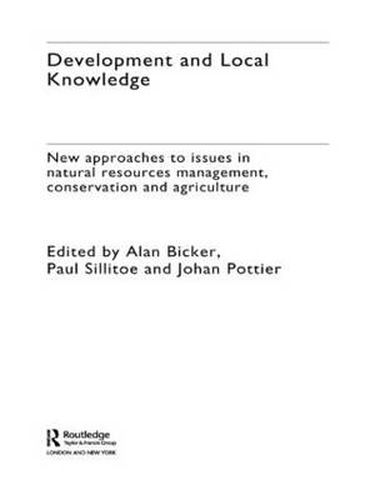Readings Newsletter
Become a Readings Member to make your shopping experience even easier.
Sign in or sign up for free!
You’re not far away from qualifying for FREE standard shipping within Australia
You’ve qualified for FREE standard shipping within Australia
The cart is loading…






Development agencies have for years been seeking a successful universal response to deprivation. Sparked by controversy and debate, the most recent trend is look for solutions among ‘local’ or ‘indigenous’ populations. Nevertheless, resources continue to be wasted in ill-conceived, centrally-imposed schemes that have not only failed to improve matters in lesser-developed countries but have often made them worse. In such instances it is not local knowledge that is problematic, but development agencies’ total misinterpretation of it as just one more ‘approach’ that can be applied universally. Local knowledge can never be that panacea, because it is not in any sense generic. Development and Local Knowledge seeks to move on from this state of impasse by illustrating that the potential of local knowledge, in development or elsewhere, can only be achieved through recognition of its essential plurality. Perspectives from leading ethnographers and development professionals on issues such as conservation, agriculture and resource management illustrate that the complexity and cultural specificity of local knowledges can only be accessed via equally diverse theories and methodolog approaches. Whilst accepting that working with local knowledge is never easy, the book offers ways of advancing the relationship between local knowledge and development, and of furthering anthropology’s role in development processes. As a rare example of serious study of local knowledge strategy and its applications, this book illustrates the growing need for real understanding of the issue and its power to assist in positive change.
$9.00 standard shipping within Australia
FREE standard shipping within Australia for orders over $100.00
Express & International shipping calculated at checkout
Development agencies have for years been seeking a successful universal response to deprivation. Sparked by controversy and debate, the most recent trend is look for solutions among ‘local’ or ‘indigenous’ populations. Nevertheless, resources continue to be wasted in ill-conceived, centrally-imposed schemes that have not only failed to improve matters in lesser-developed countries but have often made them worse. In such instances it is not local knowledge that is problematic, but development agencies’ total misinterpretation of it as just one more ‘approach’ that can be applied universally. Local knowledge can never be that panacea, because it is not in any sense generic. Development and Local Knowledge seeks to move on from this state of impasse by illustrating that the potential of local knowledge, in development or elsewhere, can only be achieved through recognition of its essential plurality. Perspectives from leading ethnographers and development professionals on issues such as conservation, agriculture and resource management illustrate that the complexity and cultural specificity of local knowledges can only be accessed via equally diverse theories and methodolog approaches. Whilst accepting that working with local knowledge is never easy, the book offers ways of advancing the relationship between local knowledge and development, and of furthering anthropology’s role in development processes. As a rare example of serious study of local knowledge strategy and its applications, this book illustrates the growing need for real understanding of the issue and its power to assist in positive change.